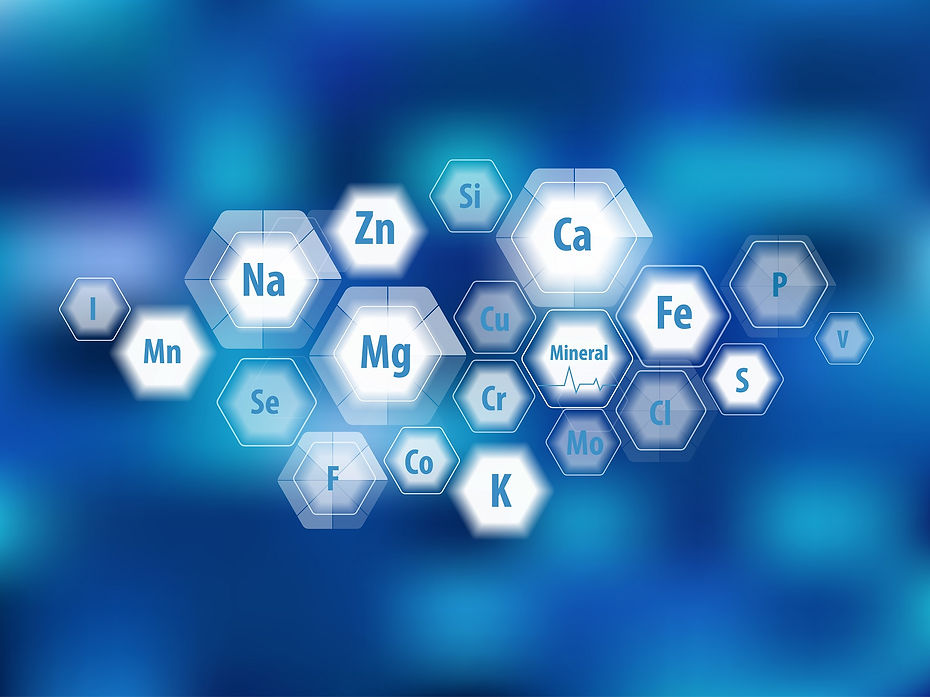
Trace minerals
What are minerals?
You may already understand the general idea of what a mineral is. Biologically speaking, a mineral is defined as a 'a chemical element required as an essential nutrient by organisms to perform functions necessary for life.' (https://medlineplus.gov/minerals.html).
Minerals are categorised as inorganic, as they are not oxygen, hydrogen, carbon, or nitrogen which compose around 96% of the human body by weight. They cannot be made by humans, (https://lpi.oregonstate.edu/mic/minerals) so they must be taken in through food, water, or supplements.
Minerals are categorised into macrominerals and microminerals or trace minerals. Macrominerals are required in higher concentrations while trace minerals are needed in smaller amounts.
This article will discuss trace minerals.
Types, and Role in the body
There are 7 main trace minerals. Each trace mineral has a unique role in the human body. Obviously each compound has multiple roles, but I am listing their main ones below. Many of them are required for enzymes to work. Enzymes are biological catalysts. In other words, they speed up the chemical reactions (metabolism) of the body. Without them, the chemical reactions would be too slow for life to be sustained – they are very important!
No.
TRACE MINERAL
ROLE IN BODY
1
Iron
Required for hemoglobin which carries oxygen in red blood cells
Prevents anemia
2
Chromium
Involved in glucose metabolism and stabilising blood glucose
(useful for diabetes)
5
Iodine
Required for synthesis of the thyroid hormones like T3 & T4
For brain function – 'Iodine deficiency is the most common cause of preventable mental impairment worldwide.'
https://synapse.koreamed.org/upload/SynapseData/PDFData/2008ENM/enm-29-240.pdf
6
Selenium
Essential for forming antioxidants and enzymes
Recommended amounts
Trace minerals are water-soluble compounds which means that they dissolve in water. This is compared to fat-soluble, which means that they dissolve in fat. Water-soluble compounds are removed from the body quickly through urine and sweat, so they must be replenished more frequently that fat-soluble nutrients such as vitamin A.
Insufficiencies in trace minerals are quite common. They do not cause big problems, but are more like tiny cuts which are not harmful but can add up over a long time.
Here are the recommended daily intakes of the trace minerals according to the US government, separated male and female when applicable:
No.
TRACE MINERAL
RDA mg - MEN
RDA mg - WOMEN
1
Iron
8 mg
18 mg
2
Chromium
0.035 mg
0.25 mg
3
Copper
0.9 mg
0.9 mg
4
Zinc
11 mg
8 mg
5
Iodine
0.15 mg
0.15 mg
6
Selenium
0.055 mg
0.055 mg
7
Manganese
2.3 mg
1.8 mg
Dietary sources
Minerals are best consumed in water and food. Ancestrally, we got a lot of our minerals from water, which used to contain high amounts of copper and zinc for example. Now due to water softening and filtering methods, these beneficial elements are removed along with the impurities. This is why we must take special attention.
Here are the highest food sources for each of the trace minerals:
No.
TRACE MINERAL
FOOD SOURCE
1
Iron
Meat, seafood, eggs
2
Chromium
Broccoli, meat
3
Copper
Liver, chocolate
4
Zinc
Oysters, red meat
5
Iodine
Seaweed
6
Selenium
Brazil nuts
7
Manganese
Grains, legumes
In general, it's safer and better to obtain your mineral requirement from the diet as it avoids chances of any toxicities or imbalances. Still, for trace minerals especially, we don't get the adequate amounts these days. Taking a multi-mineral supplement is a good idea to just cover your bases. Don't worry – they come cheap. Here is an example:
Keeping an eye on your mineral intake is important, just like your vitamin intake. They are essential compounds, so they cannot be generated from your body. Many times, taking a multi-vitamin or a multi-mineral supplement is a good idea, as it 'covers your bases' and can make sure that slight imbalances are taken care of.
Want to learn more?